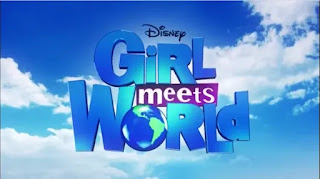Despite some fans’ opinions, I genuinely love Girl Meets World (sometimes more than Boy Meets World). It didn’t have mature subject matter, like Boy Meets World, since it was on Disney Channel and not Freeform. Regardless, it didn’t stop them from addressing powerful real-world issues. So just like I did with Boy Meets World, I want to illustrate why Girl Meets World still matters, even years after the series ended.
Bullying
Girl Meets World devotes a couple episodes to bullying. The world we live in doesn’t often have Harley Keiners pushing us up against lockers on a daily basis. However, we are hit with words from every direction. In “Girl Meets Rileytown”, Riley was being constantly attacked by the words of a virtual bully at her school. You can’t even look at Facebook without someone faceless individual tearing into someone. We can’t control how they act, but we can control ourselves. Like Riley and Farkle (in “Girl Meets Farkle”) learned, it’s up to us to own up to who we are, faults and everything, and be confident in who we are (still working on that myself). If we know who we are, angry people on the internet won’t be able to shake us.
Forgiveness
Maybe this one seems a bit basic, but in “Girl Meets Forgiveness” we see a more complex side of forgiving people. Sure, there are incidents like Lucas and Zay’s complaints against Farkle that you need to forgive and get over. But there are also hard issues, like Maya forgiving her father, that hit home. I never had to worry about divorced parents, but I’ve had to forgive myself for things that weren’t my fault. And that was Maya’s bigger issue. Sure, it’d be ideal and great to eventually forgive her father. But she was able to forgive herself and stop blaming herself for him leaving. It’s one of the moments that nearly brought me to tears.
Religion
In many respects, religion and politics are among the most taboo subjects of conversation. And “Girl Meets Belief” did a great job demonstrating what civil discourse (at least in the context of religion) can look like. We don’t get anything explicitly said about characters’ religious beliefs (except Farkle’s position as an atheist), but it’s heavily implied that Maya is agnostic and that Lucas and Riley are Christian (though even that is a little subjective). With differing religious beliefs, it can get tense (see Community’s “Comparative Religion”), but I like how the kids were led to appreciate each other’s beliefs and to keep an open mind to understand how others believe. The world could use more of that.
Divorce
With Maya’s story arc, you get a bigger picture of divorce and the effect it has on kids. But I particularly love how in “Girl Meets High School” we get it from another perspective, as Ava’s parents are in the middle of separating. Things come full circle and Maya is able to share what she’s learned from her parents’ divorce: “When people you've loved all of your life suddenly decide to leave? Well, you sit by yourself for a while and you'll try to figure it out. And you'll blame yourself. But it isn't your fault. You probably won't believe that, though, and you'll think you did something wrong, but... you didn't. It isn't your fault. And most of all, you stay with your best friend. People make their own decisions. And sometimes, they decide to go away for a while. Sometimes, it takes time to understand why. It isn't your fault.” And that bit about “Stay with your best friend” could honestly apply to any trauma, not just divorce.
The Secret of Life
From early on in the series we get the lessons about the “Secret of Life”. While I wouldn’t necessarily call it “gospel truth” there’s something to it. But I think Cory was certainly right about one of life’s secrets: People change people. I don’t think anyone would disagree that the people we choose to associate with influence us. And the people we choose to not associate with. Do you let someone build you into a better version of yourself? Do you choose friends who lull you into complacency by never challenging you? Or do you choose friends who drag you down into a gulf of misery? It seems straightforward and easy on paper, but real life is messier than that.
So as my wife and I finish Girl Meets World again, I want to quote one of Mr. Feeny’s last lines from Boy Meets World (which is posted to the wall of Cory’s classroom): “Believe in yourselves. Dream. Try. Do good.”








No comments:
Post a Comment